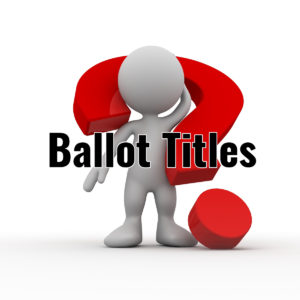Why are ballot titles so long & confusing?
Popular name and ballot title
At the general election in November there will be several ballot issues for you to vote on. They will have a “popular name” and a “ballot title.” The popular name is short, and usually doesn’t tell you much of anything and sounds like pie in the sky. The ballot title follows the popular name and is often long and confusing.
Ballot titles – Long and winding road
 Why are ballot titles so long and confusing? It often depends on whether it is an issue proposed by the people by petition or is an issue proposed by the legislature.
Why are ballot titles so long and confusing? It often depends on whether it is an issue proposed by the people by petition or is an issue proposed by the legislature.
Ballot issues initiated by the people undergo a rigorous review and approval process by the Attorney General. The Attorney General checks to see if the ballot title includes a summary of every provision. For example, before the Attorney General would approve the ballot title of Issue #3 on legislative term limits, the Attorney General required the sponsors to add more detail.
Issues proposed by the legislature sometime include several different subjects that are loosely related to a broad topic. This makes the ballot title extra complicated. The practice of dumping loosely related subjects into one piece of legislation is detested by the Arkansas Constitution but the legislature has done this since they have been given more leeway by the courts. The practice is called “logrolling.”
Logrolling includes the practice of putting two or more dissimilar subjects in the same proposal, which makes a voter who wants to vote for one subject, choose all or nothing.[i] The two main reasons logrolling is used are: (1) to build a coalition of various interests who each want something, so you mix their wish lists together in order to get enough votes to pass the issue in the legislature; or (2) to distract and confuse the voter by having them focus on one subject while including others.
Logrolling and your November ballot
Your ballot in November will have another example of logrolling by the legislature in Issue #1, which is being sold as tort reform. Logrolling has worked for the legislature in the past but in this instance the multiple subjects may have united opponents of various parts of the proposal. Opponents say it puts a cap on the value of human life, will result in many people losing their right to a jury trial in civil cases, and gives legislators and lobbyists control over court rules.
Issue #1 includes:
- a limit on the awarding of punitive damages,
- a limit on the awarding of non-economic damages,
- a transfer of power from the courts to the legislature over rules regarding court pleadings, practice, and procedure, and
- a limit on attorney contingency fees.
Issue #1 is being challenged in court for logrolling. The result of the challenge is uncertain, and the court tends to give the legislature much wider leeway with its proposals.
People’s response to past logrolling and your November ballot
Also of note is Issue #3 concerning shorter term limits for state legislators. Issue #3 is NOT logrolling but instead is a direct response by term limits supporters against the 2014 ballot issue that used logrolling and deception to give longer term limits to legislators. The 2014 amendment was sold by the legislature as an ethics amendment but included multiple subjects and at the bottom of the long ballot title said it was going to “establish” term limits. Instead of establishing term limits the 2014 issue lengthened legislative term limits.
Can we fix the long ballot title problem?
Summarizing details: It would be hard to reduce the level of detail required in issues proposed by the people. Perhaps the best we could hope for is better organization in the ballot title, so the main provisions are summarized first and then details about those provisions follow.
Logrolling: As for the legislature’s logrolling, we will just have to wait and see if the court clamps down on the confusing practice. Even if the court does not limit the practice, the legislature could fix the problem through its legislative rules and a refusal to propose any more amendments that include loosely related subjects. But this would require legislators to put the voter first ahead of politics.
In the meantime, we encourage you to learn about all of the ballot issues and listen to both supporters and opponents of the ballot issues.
[i] “While our court has never defined “logrolling,” the Maryland Court of Appeals explained that it occurs when two or more propositions essentially dissimilar in subject matter are submitted to the electorate in one amendment so that the voter may cast one vote on the measure as a whole. Andrews v. Governor of Maryland, 294 Md. 285, 449 A.2d 1144 (Md. 1982). As a result, voters are forced to vote for provisions they might not favor in order to secure passage of the provisions that are favored.” Justice Donald L, Corban’s Dissent in Forrester v. Martin, 2011 Ark. 277, 383 S.W.3d 375, 2011 Ark. LEXIS 257
